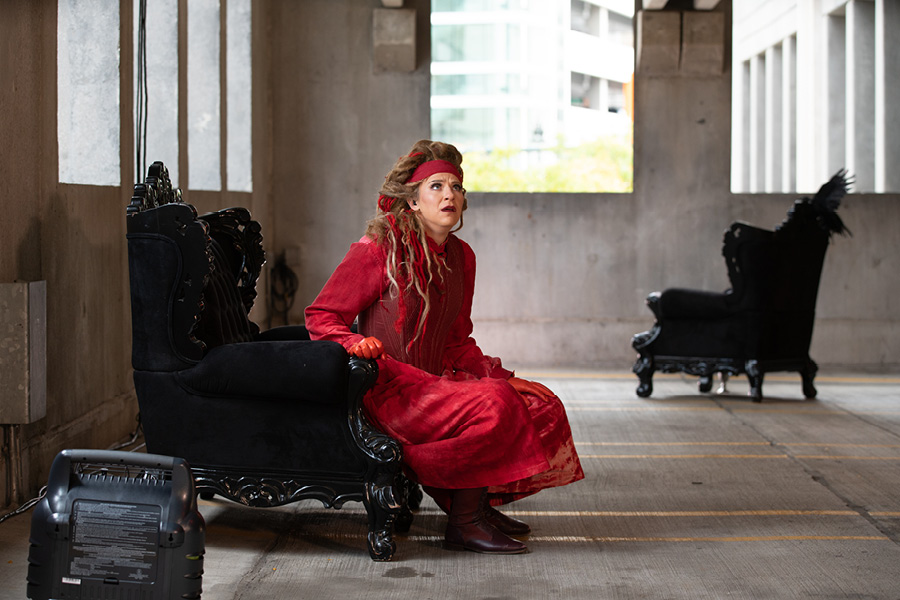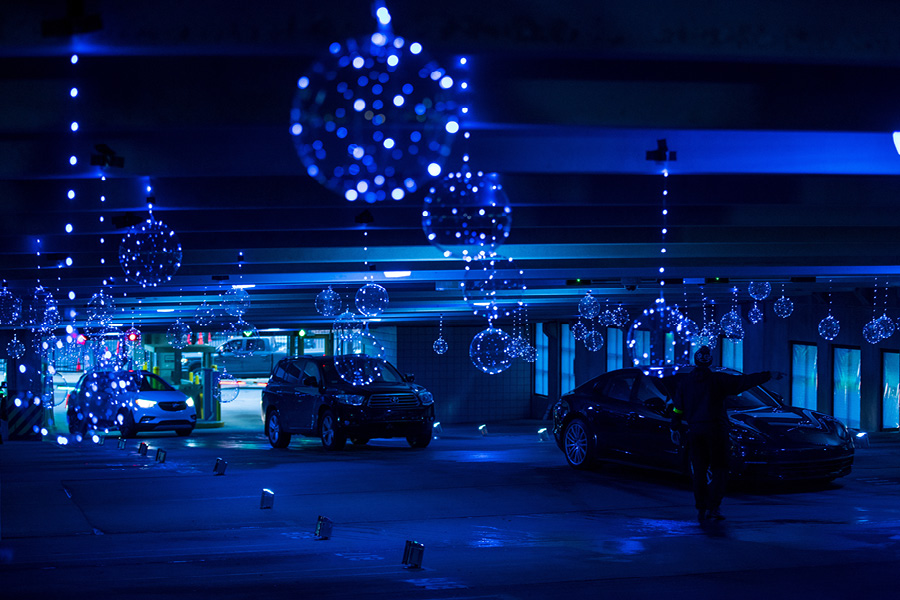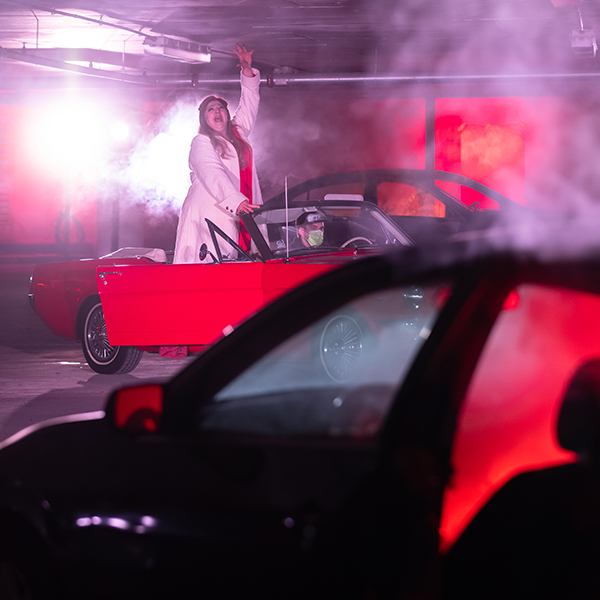April 24, 2021
Airing out Wagner’s Götterdämmerung: Wagner in the Age of Coronavirus
In the years around 1850, Richard Wagner conceived of opera in entirely new terms. He envisioned fusing every art form into what he called “music drama,” or the “total work of art.” In essays describing this novel form of opera, the composer used environmental, atmospheric, and climatic language to describe “music drama” as an analogue of the Germanic climate and as an “atmospheric ring of art and nature,” his music the “breath” of Germanic nature. His “environmental” music drama, the composer suggested, is the truest form of Germanic opera, necessary for the preservation and perfection of Germanic culture. This form of drama would, he surmised, redirect bourgeois Germans’ attention away from modern life towards Nature and its restorative properties, beneficial to Germanic culture and Germans’ collective health.
Wagner’s Ring cycle is, in part, about the devastation and destruction of the natural world and its derivative cultural artifacts at the hands of over-zealous, amoral, even capitalist actors. It offers a vision of a new world, built upon the ashes of the past. The cycle of four operas can easily be read as thematizing the composer’s own aesthetic and cultural ideations. Its final installment, Götterdämmerung, could even be read as providing a warning as to what might happen to Germanic culture if Germanic Nature were forsaken in favor of the capitalist, industrialist tendencies of modern Europe. In staging these works, Wagner invented novel, “climatic” technological apparatuses that allowed his on-stage heroes and villains to be enveloped in atmosphere; he even envisioned “water curtains” that might allow the Ring cycle’s epic river to find physical form on stage. In the course of placing the Ring narrative on stage, Wagner also gave physical form to his “climatic” concept of “music drama.”

The Ring was not intended to be viewed just anywhere. Enjoying the patronage of Bavaria’s powerful, Wagner-obsessed monarch, Ludwig II, the composer constructed a “festival theater” in the pastoral Germanic city of Bayreuth where opera enthusiasts might enjoy his Ring cycle away from cities, their smoggy, diseased air, and their cultural influences. When the Ring cycle premiered in 1876, those who wished to attend embarked on a pilgrimage that was not merely symbolic: it required visitors to reset their watches to Bayreuth’s local time zone that lay outside international (or national) standards, and travel aboard open-air railway carriages that brought them into visceral, immediate contact with Germanic air. Upon reaching Bayreuth, the festival doctor, Carl Landgraf, following Wagner’s orders, managed the environmental surroundings of the “festival theater” to maximize exposure to Germanic air and its restorative consequences. But there was little Wagner or Landgraf needed to do to convince spectators that Bayreuth was an “aerial” destination: since 1805, the city had been home to two psychiatric asylums that made use of “aerial cures” to cleanse the body and mind. Visitors’ environmental experience at the festival thus re-doubled the aerial and environmental parameters at the core of Wagner’s aesthetic program.
This brief tour of Wagner’s atmospheric “hall of mirrors” might seem to reflect an idiosyncratic artistic mentality. However, it was common during the composer’s lifetime for Germanic artistic thinkers to cast music as analogous to Germanic Nature. It was also common for them to meditate upon the relationship of seemingly fixed climatic conditions on the culture and art of the people living under them, with climate acting as a means of constructing cultural hierarchies bound to immutable Nature. Wagner, however, pressed these contemporary thought patterns into the service of a distinct political program. His writings suggest an attraction to the theory of climatic determinism, which maintained that climatic and aerial conditions determined their inhabitants’ every quality, from laws and manners to physical and racial attributes. The composer’s likening of music drama to Germanic climate and air—and extension of these ideas to his works’ dramaturgy, the environmental parameters of his Bayreuth Festival, and his treatment of Nature in the Ring—was an expression of political power and control. Wagner’s “atmospheric” dramas were intended to condition Germanic values in modern bodies and even provide physical rejuvenation. The simple act of experiencing a Wagnerian opera physically enacted the central aim of Götterdämmerung, shared with the composer’s larger artistic project: replacing the old order with a new one.
The Ring is regularly interpreted by opera directors as an anti-modern, pro-nature parable. Directors have reified the tetralogy’s political terms that dovetail with the composer’s aesthetic theories. Yuval Sharon’s production is not alone in adopting this approach to the Ring, which could probably be traced to the 1976 Bayreuth Festival, where director Patrice Chéreau exposed the politics beneath Wagner’s myths and updated them for his own age. Building on this impulse, the San Francisco Opera’s most recent Ring cycle, directed by Francesca Zambello in 2018, depicted the Ring as a tale of extraction of the American West’s natural resources. The Bayreuth Festival’s 2016 tetralogy, directed by Frank Castorf, positioned Wagner’s heroes amidst garages, gas stations, and trailers.

Sharon’s Twilight: Gods is part of this lineage but also stands apart. Twilight: Gods does not simply update and localize the tetralogy’s politics by setting it against the backdrop of downtown Chicago. Enveloped in an underground chamber of urban, industrial air, the Lyric Opera’s Twilight: Gods returns to ground zero of Wagnerian political, aesthetic, and ecological thought: air itself. In downtown Chicago, that air might be sooty (like the nineteenth-century industrial cities Wagner despised), but in the opera house’s underground parking structure, it is offset by the pure air of Wagnerian climatic drama. In this way, the production invites viewers to directly enact the work’s restorative logics. It propels viewers into a pilgrimage through Chicago’s industrial airscape taken below ground: that pilgrimage involves experiencing the opera from within the air-conditioned confines of their automobiles’ interior (filled with Wagner’s disembodied aerial sounds, filtered through an FM radio station), and envelops those aerial pods with the aerated vibrations of Wagner’s drama. This production might be understood as “about” the interrelationships of music, bodies, and air, thereby enacting the most fundamental aspects of the composer’s aesthetic ideations.
In many ways, Sharon, like his predecessors, seeks to update the Ring for his time. Wagner was deeply devoted to manipulating spectators’ aeriform environment. He believed that doing so might reverse the impact modern, sooty, diseased air might have on their bodies and their minds. Today, by presenting Götterdämmerung as an aerial drama, Sharon draws attention to a similar set of crises of environmental stewardship and public health (COVID-19) that inhabit the air around us. This Götterdämmerung might not meet Wagner’s socio-cultural aims, but it does thematize air in a moment of aerial catastrophe—air that, Wagner imagined, would guarantee physical fortitude.
Kirsten Paige is a Postdoctoral Fellow at Stanford University. She received her PhD in Music History from UC Berkeley in 2018. Paige's work demonstrates how scientific knowledge reshaped musical practices and aural cultures in the 19th and 20th centuries. Her essays have appeared, or are forthcoming, in the Cambridge Opera Journal, The Opera Quarterly, the Journal of the Royal Musical Association, and the Journal of the American Musicological Society.
Twilight: Gods
Twilight: Gods
Experience an original film that captures Lyric's sold-out Chicago premiere of Twilight: Gods, a reimagining of the final chapter of Wagner's epic Ring cycle.
Filmed during the live production at Millennium Park Lakeside Garage in Spring 2021, this unique, drive-through experience was conceived by director Yuval Sharon, who wrote the new English texts, and features poetic transitions written and performed by Chicago interdisciplinary artist avery r. young. Chicago filmmaker Raphael S. Nash has created this original new feature from the critically-acclaimed production and it showcases the performances, video work and installations brought to life by singers, instrumental groups, and actors.

